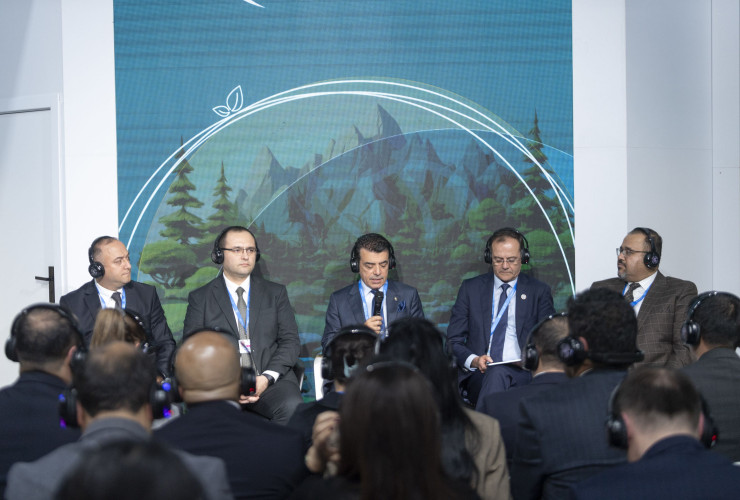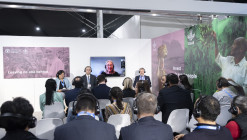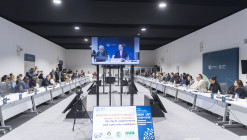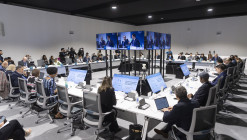
A panel discussion on “Developing heritage for a sustainable future: adapting agriculture, culture and resilience to climate change” was held within the framework of the 29th session of the Conference of the Parties to the United Nations Framework Convention on Climate Change (COP29).
The event, which took place at the Islamic World Educational, Scientific and Cultural Organization (ICESCO) pavilion in the Blue Zone, discussed the formation of a holistic approach to sustainable development through the integration of agricultural heritage with modern practices to address climate change, protect biodiversity, manage natural resources and promote socio-cultural values.
The panel discussion was moderated by Azad Jafarli, Chief of Staff of the Ministry of Agriculture. The meeting was addressed by Majnun Mammadov, Minister of Agriculture of the Republic of Azerbaijan, Salim bin Mohammed al-Maliki, Director-General of ICESCO, Manuel Barange, Assistant Director-General of the Food and Agriculture Organization of the United Nations (FAO), and Hesham Al-Askari, Advisor to the Director-General of ICESCO.
Azad Jafarli, Chief of Staff of the Ministry of Agriculture, drew attention to the need to develop climate-smart agricultural policies that support the integration of traditional agricultural practices with innovative technologies and solutions against the backdrop of modern challenges. Noting that agricultural traditions and cultural heritage are developing mutually as a result of agricultural activity, Azad Jafarli emphasized that this factor will positively affect the application of modern technologies, becoming a solid foundation for successful activity in the future.
At the event, Minister of Agriculture Majnun Mammadov touched upon the topic of “Integrating Tradition with Innovation: Azerbaijan’s Multifaceted Approach to Sustainable Agriculture”. He spoke about Azerbaijan's agricultural heritage and its role in preserving biodiversity and water management, and successful research on combining traditional agricultural techniques with modern technologies to adapt to changing climate conditions.
Minister Majnun Mammadov said that Azerbaijan, a country with a rich history and deep-rooted agricultural traditions, has favorable climatic conditions for the cultivation of various plants. However, climate change is affecting Azerbaijan, as it is all over the world. In recent years, drought, water shortages, as well as irregular rainfall have been frequently observed in the country. The Minister touched upon the measures taken to adapt the agricultural sector to climate change in Azerbaijan, and drew attention to the continuous work being carried out in our country to protect the environment and ensure the efficient use of land and water resources. Noting that most of the water resources are formed outside the country, the Minister emphasized that innovative approaches and modern technologies play a very important role in combating climate change, and that the processes of modernization of irrigation systems and creation of more efficient water management systems are currently ongoing in Azerbaijan. At the same time, the use of digital and technological innovations in agricultural production processes is stimulated, precision farming methods and innovative practices in the agricultural sector are preferred, large-scale and systematic measures are taken to protect land and preserve biodiversity. The Azerbaijani government continues to support measures to ensure food security, increase the competitiveness of farmers and create sustainable agriculture.
ICESCO Director General Salim bin Mohammed al-Maliki touched upon the importance of climate-friendly agriculture, biodiversity conservation, and water management. The ICESCO official noted that biodiversity loss, climate change, land degradation, and water scarcity pose major threats to agro-food systems. He drew attention to the need for cooperation in the areas of digital transformation of agriculture, technology transfer in this field, and sharing of best practices in order to achieve sustainable development against the backdrop of modern challenges.
Azad Jafarli, Chief of Staff of the Ministry of Agriculture, Manuel Barange, Assistant Director-General of the Food and Agriculture Organization of the United Nations (FAO), and Hesham Al-Askari, Advisor to the Director-General of ICESCO, shared their views on the efficient use of land and water resources, the application of resource-conserving approaches, environmental protection, sustainable and innovative farming traditions, the protection and efficient use of genetic resources of cultivated plants, the collection, storage and increase of local gene pool materials, and the exchange of experience in these areas in response to new challenges.
The panel discussions continued in a question-and-answer format.

A panel discussion was held on the topic of “Just Transition in the Agriculture-Food System: Integration in Accordance with the COP29 Harmony Initiative” within the framework of COP29
21 November 2024

A panel discussion on achieving sustainable agro-food systems was held within the framework of COP29
21 November 2024

The Director of the Agricultural Research Center spoke at the panel discussions within the framework of COP29
21 November 2024

A panel discussion was held on the topic of “A Working Mechanism for Climate Finance for Farmers: On-Farm Experiences and Concrete Solutions”
19 November 2024

Ministerial meeting on the Food and Agriculture for Sustainable Transformation (FAST) partnership was held
19 November 2024